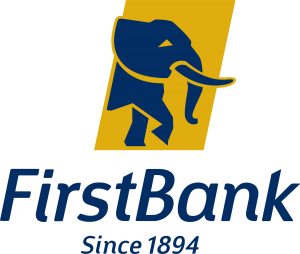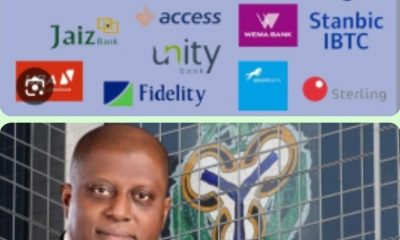Bank
Stock Exchange rates Fidelity Bank highest on corporate governance

Stock Exchange rates Fidelity Bank highest on corporate governance
Fidelity Bank Plc complies with the highest corporate governance standards as the leading commercial bank adheres promptly to all full disclosure requirements and global best practices.
Fidelity Bank is awarded CG+, the highest rank under the Corporate Governance Rating System (CGRS), which screens quoted companies against prescribed best practices and standards.
A review of the latest compliance report showed that Fidelity Bank sustains its highest-ranking rating of CG+, with shareholders and market pundits commending the high corporate standards of the bank.
Head, Listings Regulation Department, NGX Regulation (NGXRegco), Mr. Godstime Iwenekhai, explained that the CGRS was designed to strengthen the governance structures of listed companies and provide a valid basis for discerning investors to differentiate between listed companies on the basis of their compliance with acceptable standards of corporate governance.
“In our view, corporate governance promotes ethical business practices, transparency and fair competition,” Iwenekhai said.
He pointed out that the special character combination “CG+” underlined compliance with best practices and highest corporate governance standards, which entitle the rated companies to special privileges at the stock market.
Corporate governance compliance at the stock market includes prompt submission of detailed operational results from period to period as required by the market rules, full disclosures of all material and regulated information and accurate rendition of reports and accounts.
Also, compliance includes ensuring that the company’s shares are not encumbered in a way that impinges on free float or number of shares available to the general investing public for efficient price discovery, compliance with all investor-protection safeguards in communication with shareholders and organizing statutory meetings as required among others.
The Nigerian Exchange (NGX) noted that compliance tracker was aimed at maintaining market integrity and protecting the investors, noting that listed companies are required to adhere to high disclosure standards.
“Financial information which is periodic disclosure and on-going material events disclosure should be released to NGX in a timely manner to enable it efficiently perform its function of maintaining an orderly market,” NGX stated, referencing some of the criteria for its corporate governance rating.
Market experts and shareholders agreed that corporate governance compliance is a major factor in deciding on investing in a public and the safety of such investment.
Managing Director, Arthur Steven Asset Management, Mr. Olatunde Amolegbe, said corporate governance compliance rating is “extremely important” as it indicates to the investing public the quality of compliance of a company to listing requirements.
“As you know, stock prices are driven primarily by available information and the NGX has a minimum level of disclosure expected of quoted companies. This disclosure helps the public make qualitative decisions as to the state or performance of the companies they are seeking to invest in. These markers are therefore the initial indicators as to whether the companies are meeting their disclosures and other regulatory obligations or not,” Amolegbe, a former president of Chartered Institute of Stockbrokers (CIS), said.
Managing Director, APT Securities & Funds, Mallam Garba Kurfi, said the corporate governance rating “shows the extent companies are in compliance with corporate governance”.
“High rating means very good in doing right thing timely while low rating discourages foreign investors from investing in such companies,” Kurfi, a leading market operator and member of the board of Securities and Exchange Commission (SEC), said.
Managing Director, HighCap Securities, Mr David Adonri, noted that “CG+ means excellent corporate governance rating”.
“When a company is organised and uphold good corporate governance, the benefit to stakeholders is maximized,” Adonri said.
Investors said its high corporate governance was one of the compelling reasons they chose to invest in Fidelity Bank.
President, Association for the Advancement of Rights of Nigerian Shareholders (AARNS), Dr. Faruk Umar said Fidelity Bank has a very good corporate governance structure that reassures investors of the safety of their investments.
According to him, while the bank has good succession plan, the calibre of the independent non-executive directors on the board gives shareholders strong confidence of the kind of board oversight they will be expecting.
National Coordinator, Independent Shareholders Association of Nigeria (ISAN), Mr. Moses Igbrude, said Fidelity Bank’s impressive performance over the years had been built on good corporate governance.
“My appeal to the board is to continue to imbibe good corporate governance in order to sustain this growth,” Igbrude said.
National Coordinator, Pragmatic Shareholders Association of Nigeria, Mrs. Bisi Bakare, said Fidelity Bank has created a “very excellent impression” in the minds of shareholders.
According to her, the bank has continually showcased exemplary leadership with continuous impressive results, with successive growths over the past five years.
“Fidelity Bank is a very good bank that shareholders are very happy with their investments and we have never regretted buying into Fidelity Bank,” Bakare said.
National Coordinator, Progressive Shareholders Association of Nigeria, Mr. Boniface Okezie said good corporate governance was the cornerstone of Fidelity Bank’s sustained growth and impressive returns over the years.
“Fidelity Bank remains one of the best stocks that investors should look forward to invest in for better returns. I’m very optimistic of the bank’s healthy strong assets. With its good corporate governance and excellent customers’ service, there is every reason to hope for more promising future,” Okezie said.
The NGX tags defaulting companies for poor corporate governance and also applies various monetary and non-monetary sanctions, including fines ranging between N100,000 to N100 million, partial or full suspension of trading, naming and shaming with a red alert tag and compulsory delisting in extreme cases.
Bank
Alpha Morgan to Host 19th Economic Review Webinar

Alpha Morgan to Host 19th Economic Review Webinar
In an economy shaped by constant shifts, the edge often belongs to those with the right information.
On Wednesday, February 25, 2026, Alpha Morgan Bank will host the 19th edition of its Economic Review Webinar, a high-level thought leadership session designed to equip businesses, investors, and individuals with timely financial and economic insight.
The session, which will hold live on Zoom at 10:00am WAT and will feature economist Bismarck Rewane, who will examine the key signals influencing Nigeria’s economic direction in 2026, including policy trends, market movements, and global developments shaping the local landscape.
With a consistent track record of delivering clarity in uncertain times, the Alpha Morgan Economic Review continues to provide practical context for decision-making in a dynamic environment.
Registration for the 19th Alpha Morgan Economic Review is free and can be completed via https://bit.ly/registeramerseries19
It is a bi-monthly platform that is open to the public and is held virtually.
Visit www.alphamorganbank to know more.
Bank
Separating Fact from Confusion: What Nigerians Need to Know About the 7.5% VAT on Banking Service Fees

In recent weeks, digital-banking customers and social media, especially on Twitter have raised concerns about deductions labelled as “VAT” on transfers and other charges.
Some dangerously false narratives, which when you take a critical look, you’ll clearly see that they have been orchestrated and sponsored by malicious elements, have given the impression that the 7.5% Value Added Tax (VAT) is a new or arbitrary charge introduced by fintechs, or that it applies to the amounts customers send. These claims are misleading and deserve careful clarification which is the purpose of this piece.
First, it’s important to understand how VAT works in Nigeria’s financial sector today. VAT on fees and charges for financial services has long been part of Nigeria’s tax system. The then Federal Inland Revenue Service (FIRS) had issued information circulars on March 31, 2021 where it stated that VAT on Financial Services (Circular No. 2021/04) that most fees, commissions, and charges by financial institutions (banks, insurance companies, brokers) are subject to 7.5% VAT.
This justifies a recent advertorial the Nigeria Revenue Service (NRS) which stated unequivocally that VAT was not newly introduced on banking service charges by recent tax reforms, and that it did not impose a new tax obligation on customers in that regard.
However what was left unsaid in that publication was that on the 12th of December, the tax agency had written to all financial institutions and payment gateways based on past meetings with operators that following from the new Tax Act, they were reminded of their mandatory obligations to collect, deduct and remit VAT at the prescribed rate.
The Agency then gave an 18- day grace period to all players to configure and align their systems while directing full compliance with the directive with effect from January 19, 2026. And so, some fintechs sent messages to their customers in the spirit of clarity and transparency.
It must be said that what has changed is that in a bid to widen the tax net, microfinance banks and fintechs who were not obligated to deduct and remit said VAT before now, have now become compelled to do so. The enforcement and standardised collection of VAT across banks and fintech platforms including mobile transfers, USSD transaction fees, and card issuance fees with compliance deadlines issued by tax authorities. So why anyone would vilify any financial institution obeying the laws of the land beats my imagination.
For those who have raised questions around transparency and wrongly suggesting that fintechs are suddenly imposing new, unexplained costs on users – as it has been explained above, this is a matter of regulatory compliance, not a lack of transparency or customer exploitation. These VAT deductions are not new fees created by the companies themselves, and providers are not arbitrarily raising their prices.
In closing, two things that everyone must bear in mind as we move forward in this new tax climate – all stakeholders including fintech platforms and regulators must communicate better and clearly. Nigerians must refrain from peddling unsubstantiated claims and malicious narratives, it has no benefits for anyone and erodes trust in systems.
Bank
FirstBank Introduces Exclusive 500-Seater Bleacher at Carnival Calabar & Festival 2025

FirstBank Introduces Exclusive 500-Seater Bleacher at Carnival Calabar & Festival 2025
Lagos, 26 December 2025 – FirstBank, West Africa’s premier financial institution and financial inclusion services provider, has officially announced its sponsorship of the Carnival Calabar & Festival 2025, unveiling a landmark addition set to redefine the carnival experience — the first-ever private premium seating area at the event.
The highlight of FirstBank’s participation is the construction of a 500-seater premium bleacher, designed to provide comfort, safety, and an elevated viewing experience for carnival enthusiasts.
Speaking on the sponsorship, the Acting Group Head Marketing and Corporate Communications, FirstBank, Olayinka Ijabiyi, noted that the carnival aligns with the Bank’s First@Arts initiative, a platform dedicated to supporting the creative arts value chain across Nigeria. He said, “We recognise the transformative power of the arts, including carnivals, in inspiring people and strengthening national unity. For more than 131 years, we have supported platforms that promote self-expression, social reflection and cultural exchange. Our investment in the Carnival Calabar & Festival demonstrates our commitment to preserving the nation’s rich cultural heritage through First@Arts.”
“As part of our sponsorship this year, we are introducing the first-ever private 500-seater premium bleacher to further elevate the carnival experience. This exclusive seating is designed to provide exceptional comfort and an unforgettable viewing experience for attendees,” Ijabiyi added.
The Chairman of the Cross River State Carnival Calabar Commission, Gabe Onah, also commented on FirstBank’s sponsorship. “FirstBank’s involvement is a strong demonstration of private-sector support for culture and tourism. This partnership not only enhances the overall quality of the carnival but also strengthens its global appeal,” he said.
The Carnival Calabar & Festival 2025 is officially marketed by Okhma Global Limited, the appointed Official Marketer responsible for brand partnerships, promotional engagements, and ticket sales. Okhma Global Limited has partnered with the Cross River State government in delivering Carnival Calabar & Festival for over ten years, playing a key role in strengthening the carnival’s commercial growth and global visibility.
-

 celebrity radar - gossips6 months ago
celebrity radar - gossips6 months agoWhy Babangida’s Hilltop Home Became Nigeria’s Political “Mecca”
-

 society6 months ago
society6 months agoPower is a Loan, Not a Possession: The Sacred Duty of Planting People
-

 society5 months ago
society5 months agoReligion: Africa’s Oldest Weapon of Enslavement and the Forgotten Truth
-

 news6 months ago
news6 months agoTHE APPOINTMENT OF WASIU AYINDE BY THE FEDERAL GOVERNMENT AS AN AMBASSADOR SOUNDS EMBARRASSING








